|
SERVICES WE OFFER
Research
The Wildlife Project conducts research projects and investigations related to the natural history, conservation, and population dynamics of native and non-native wildlife species in California and Central America. We are currently working on several projects in California, which we hope will facilitate the creation and management of mitigation sites for central California amphibians and reptiles.
Our research monies are grant based, self-funded, client funded, or a combination of these. Our most recent grant, from the Contra Costa Fish and Wildlife Committee and the Mt View Sanitary District, is funding a study on the population structure of the western pond turtles in wastewater treatment ponds in Martinez, California. We anticipate expanding this project next year to include seasonal movement patterns of western pond turtles in natural and created habitats.
|
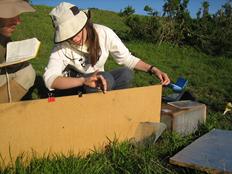 |
| Wildlife Biologist Sarah M. Foster |
|
|
Wildlife Inventories and Consulting
The Wildlife Project regularly engages in wildlife and vegetative species inventories and surveys. We have conducted hundreds of surveys, over hundreds of thousands of acres, in many parts of the western United States. Work related to CEQA regulatory compliance requirements frequently requires protocol level and/or intensive wildlife and vegetation investigations. We consider this one of our strong suits, and assist a variety of clients—from private landowners and land trusts, to utility districts and governmental organizations—with all of their wildlife needs.
|
Training and Workshops
The Wildlife Project has been, and remains committed to training peer groups, the general public, and public and private organizations. We regularly offer workshops for large groups of biologists on survey techniques and natural history of native fauna. Smaller, customized workshops and training are also offered on request. We have created field training for the US Forest Service, regional Mosquito Abatement districts, federal and state resource agencies, and many consulting biologists. The trainings we provide are typically field-based, with an emphasis on handling and habitat associations.
Our federal and State permits allow us to handle special-status species and train other biologists toward certification. If you are looking for training opportunities to help meet federal or state permitting requirements, our workshops can meet those needs. Check our Notes & News page for current workshops.
|
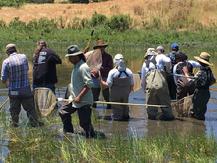 |
| Our most recent group working to sample CRLF during the CRLF II workshop |
|
|
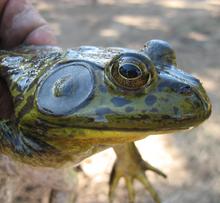 |
| Bullfrog control can be very effective at improving habitat for native species |
|
|
Bullfrog Control
Control of bullfrogs may be required by your Incidental Take Permit (ITP), Biological Opinion (BO), Lake and Streambank Alteration Agreement (LSAA or SAA), or other regulatory mechanism. On the other hand, you may want to enhance or restore habitat by removing bullfrogs. This type of wildlife management can be critical to improving habitat for California red-legged frogs, foothill yellow-legged frogs, western pond turtles, giant and San Francisco garter snakes, and other native species. We have developed an agency approved method to cull or remove bullfrogs (lethal removal) that is effective, and as humane as possible (minimize suffering). Our method is so effective that we offer a peer-level workshop that will allow other biologists to see, learn, and use this method to control bullfrogs on their sites. This method may require the user to have a federal recovery permit, which we possess, so that control can be conducted in the presence of special-status species.
|
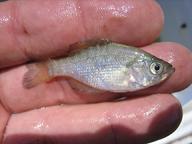 |
| Bluegill (Lepomis macrochirus) |
|
Pond Management
The Wildlife Project has decades of experience working with stock ponds on projects that range from fish planting or removal (yes, we see the irony) to management of vegetation, silt removal, reconstruction, and general habitat assessment. We've worked with local resource conservation districts, the National Resources Conservation Service, private landowners, wineries, land trusts and others.
Pond management in areas where endangered or threatened species exist or may exist often include permitting and other regulatory constraints with which we are very familiar. The Wildlife Project is very familiar with these requirements and fully capable to assist you through these processes.
|
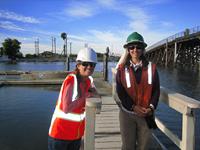 |
| Construction monitoring on the Bethel Island Bridge replacement |
|
Construction Monitoring
We conduct construction monitoring for California tiger salamander, San Joaquin kit fox, Western pond turtle, Ridgway's Rail, Swainson's Hawk, California red-legged frog, and dozens of other special-status species. Special-status species monitoring can include preconstruction surveys and monitoring, Constructions monitoring, post construction monitoring, and report. We work under Biological Opinions, Streambank Alteration Agreements, Incidental Take Permits, Habitat Conservation Plans, and other regulatory documents. We feel that we stand-out in this area in that we consider this a professional level task that keeps our clients out of trouble and keeps their project moving forward.
|
|
Wildlife Viewing
Eco-tourism was a very exciting part of the services that we provided for many years. More recently, The Wildlife Project has been working on a Public Broadcasting System television video series called "Wildlife Watching". This series aspires to inform viewers (from seasoned biologists to the backyard bird watcher) about the "where, when, and how" of wildlife watching. We travel to a new site each episode, and recommend trails and vistas for seeing the wildlife we've captured for our show. For more information, check out the website at WildlifeWatching.com.
|
|